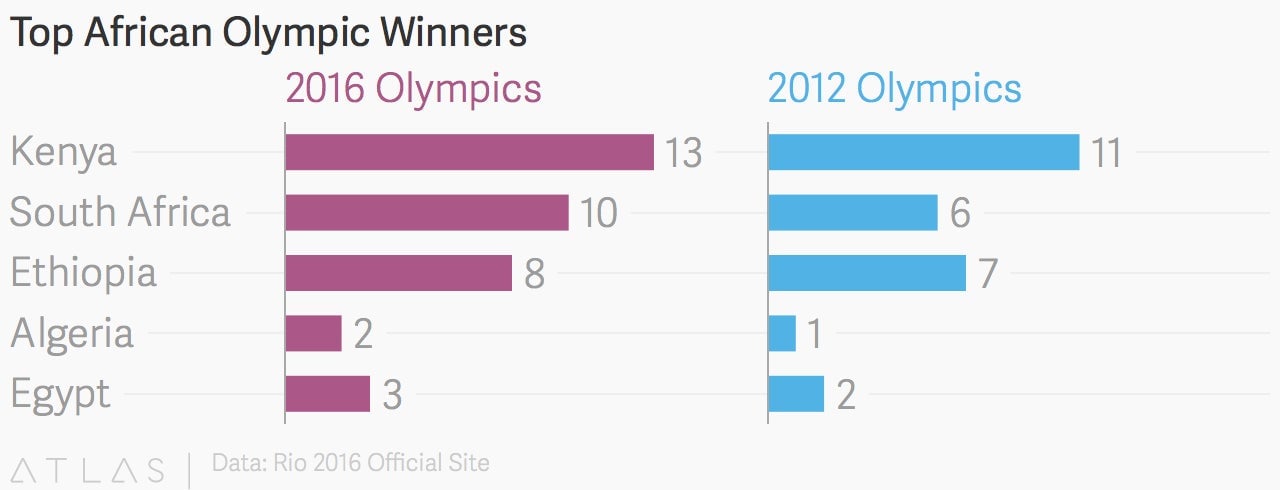Africa’s Olympics, Gabon’s birthers, Kenya’s capped rates
Hi, Quartz Africa readers!

Hi, Quartz Africa readers!
[insertSponsor]
The disruptors’ dilemma
A few weeks ago, the Central Bank of Nigeria (CBN) did something the late Fela Aniklulapo-Kuti used to call, ‘Government Magic’. That’s when you wake up on any given day in Nigeria (and indeed many other African countries) and the government has suddenly proposed a new law, rule, edict or somesuch which has suddenly (and to borrow from Fela again) turned “green into white” or “red into blue.” In this case the CBN introduced new rules on the money transfer industry which severely curtails the market activity of independent operators.
Feyi Fawehinmi explains in detail here how this harms disruptive businesses who use technology and market savvy to lower the exorbitant fees charged by the big traditional players in a $21 billion market. Only the biggest players would benefit from CBN’s new rules.
It’s a recurring theme. Many African governments struggle with the impact of technology and innovation much more than they should. They’re instinctively at odds the investor community, social enterprise world and hundreds of visionary entrepreneurs who are betting on innovation to lift the continent from its commodity-dependent boom and bust cycles.
But while African governments pay lip service to this idea—that technology and innovation will have a lasting positive impact on the future of their citizens—few of their actions seem to support that position.
Perhaps we need a different approach to innovative disruption in countries like these ones. We could start with having officials in government regulatory agencies who understand the benefits of innovation as well as they seem to understand the threats.
Yinka Adegoke, Quartz Africa editor
Five stories from this week
Kenya capped lending rates. President Uhuru Kenyatta approved a controversial cap on commercial lending rates at 4 percentage points above the central bank’s benchmark rate. Critics called the decision, “Kenya’s Brexit,” writes Lily Kuo, a “popular but unwise” move ahead of next year’s elections.
Destroying history as a war crime. Extremist fighter Ahmad al-Faqi al-Mahd admitted to destroying parts of Timbuktu, the fabled West African trading city, in the International Criminal Court’s first case based on the destruction of cultural artifacts. His admission of guilt is also the first time an ICC defendant has pleaded guilty.
Mobile money is catching on in Nigeria. After years of indifferent take-up, Nigerians are finally using mobile money services more frequently, reports Yomi Kazeem. Paga, a leading payments company in Nigeria, says money transfers now outstrip merchants payments on its platform.
The last country to abolish slavery is jailing its anti-slavery activists. West African nation Mauritania, which only just abolished slavery in 2007, sentenced 13 anti-slavery activists to prison for their role in a protest aimed at denouncing the practice of slavery in the country.
Gabon’s birther movement takes on a 50 year-old political dynasty. A dive into the unusual politics of the central African country, where the president and the leading opposition rival have both had their citizenship questioned. But the more pertinent question is whether there’s really any chance of unseating president Ali Bongo, whose wealthy family has ruled Gabon for 50 years.
Chart of the Week
African countries’ best Olympics yet. The Rio 2016 Olympic Games was Africa’s most successful, with 11 countries winning a total of 45 medals. Kenya led the continent with a total of 13 medals, and the world fell in love with its national anthem when it was played for the sixth time. But as Abdi Latif Dahir writes, the continent’s teams had to overcome significant hurdles including logistics difficulties, doping allegations and even a lack of sports gear.

Other things we liked
Engaging Eritrea. The Horn of Africa nation is viewed as a pariah state, and has been described as “Africa’s North Korea.” But given recent rapprochement efforts from Europe, Rufael Tecle writes that unless Europe demands certain conditions from Asmara, it will simply be strengthening the very regime responsible for thousands of Eritreans fleeing the country every month.
War of the roses. Flower-growing is a $500 million business in Kenya that dates back to 1969. But that trend is being threatened with the emergence of a $200 million industry in neighboring Ethiopia. Bloomberg’s William Davison and Samuel Gebre write that exponential growth is being aided by a combination of tax breaks, state bank loans, and an intolerance of graft.
Hitting the gym. Egypt is the 17th most obese nation in the word, where fast food and smoking joints proliferate across the country. But as Rod Nordland writes in the New York Times, more and more Egyptians are taking to the gym, more for fitness sake than for competition or games.
Keep an eye on
Education to take you places.
African universities were initially created in the colonial era to train functionaries of the civil service
. This, he says, emphasizes conformity and not creativity or innovation. To learn more about how to change African universities, join
for a Twitter Q&A Mon. Aug. 29 at 9am EDT/2pm GMT+1/4pm EAT. #AskCJuma.
Protests in Zimbabwe. Police clashed with protestors on Friday in Zimbabwe’s capital, Harare, blocking off the site of a protest despite a court order backing. President Robert Mugabe has already warned the anti-government demonstrators, saying there will be no “Arab Spring” in Zimbabwe.
Our best wishes for a productive week ahead. Please send any news, comments, and east African roses to [email protected]. You can follow us on twitter at @qzafrica for updates throughout the day.